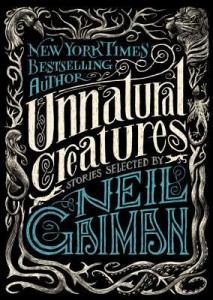Creating Multidimensionality: Ozioma the Wicked edition
 The fourth story in Unnatural Creatures, Ozioma the Wicked, is equal parts amazing and frustrating. The parts I am most frustrated with are also the parts that ring most true (mainly the contradictions bother me but they also bother me in my life outside of books). What’s frustrating is how many questions this story raises about treatment of women and of the economically disadvantaged and how interwoven it is– but that’s what makes the story so good and why it isn’t a flat story. (Warning: Thar be spoilers below!)
The fourth story in Unnatural Creatures, Ozioma the Wicked, is equal parts amazing and frustrating. The parts I am most frustrated with are also the parts that ring most true (mainly the contradictions bother me but they also bother me in my life outside of books). What’s frustrating is how many questions this story raises about treatment of women and of the economically disadvantaged and how interwoven it is– but that’s what makes the story so good and why it isn’t a flat story. (Warning: Thar be spoilers below!)
How Okorafor makes the universe multidimensional:
1) Don’t be afraid of contradictions.
Example 1: Ozioma is wicked because she can talk to snakes, even though their goddess, Aida-Wedo, is half-snake.
Snakes are a deadly pest where Ozioma lives in rural Nigeria. On the one hand it makes sense that anyone associating with snakes, even if that person saves people from snakes, is seen as wicked. However their goddess, Aida-Wedo, is part woman and part snake. It seems weird, and this may be the Christian in me, that something that shares a feature with their goddess, even if it is deadly, would be respected and anyone associated with them would also be respected.
Example 2: Females are less important even though they worship a female deity. (The direct quote is, “”Only her mother would disagree [that Ozioma is wicked], but her mother was a mere fourth wife to a dead yam farmer. So no one cared what she thought.”)
This is another duality that perhaps I’m not catching on because of how I’ve been raised: how can they praise a goddess and not treat women equally? Part of it may also be a socioeconomic issue where they are less important because they are poorer but the fact that it’s a woman without a man and not the first wife also matters. By extension Ozioma doesn’t matter. This of course has my brain spinning as many options as I can come up with: would it be different if her father could speak up for her? would it be different if the mother were the first wife? would it be different if the yam farmer was the richest man in town? or if the yam farmer was a local leader? would it be different if Ozioma was a male? I don’t know. But this is the world we live in. One full of contradictions. I can remember being told in church that it is Adam and Eve in the Bible not Adam and Steve– as if we need an exact example from a book to tell us we should treat everyone equally and love everyone (which is Bible’s main message). Plus it says some not so great things about women in the Bible (I was particularly obsessed with how a woman becomes an adulteress after divorce but it said nothing about a man when I was in middle school.)
2) Questions can go unanswered as long as the story resolves.
Besides all the questions about the contradictions that come up I was left wondering if the ladder on the tree was always there and if so how have they never had this problem before? Judging from the description the narrator gives and Ozioma’s own thoughts I don’t think the ladder is always there but at the end the ladder doesn’t recede which makes me wonder if it always is there. Or if they had, is that why Ozioma didn’t question this being claiming a tree that wasn’t his to take? Maybe the reason Ozioma doesn’t tell the being is because she knows it can kill her and although she’ll die for her town, she won’t provoke the being by saying, “That’s not yours.” I also wondered why no one, not even Ozioma, prayed to Aida-Wedo to save them. I think this is another Christian mindset though because my friend who is a non-practicing Pagan says that you don’t want the attention of your deities, because if they decide to pay attention whatever they do, “is on you baby girl” (as my friend says).
3) Bring in small details that go to every sense.
The descriptions of the ingredients in Ozioma’s stew makes my mouth water even though I think onions are the spawn of bad taste and bad texture (unless they’ve been caramelized). “She’d cut the onions with care, savored in the soft, firm perfection of the red tomatoes, shaken in a combination of thyme, red pepper, salt, and curry, and marveled at the greenness of the greens.” There’s more food descriptions but I’ll spare you the need to go get a snack involving baked chicken and all the other ingredients.
It’s raining during the encounter and there are continual small reminders about it. Water droplets falling from a man’s lips as he speaks, her clothing is soaked, and rain beading on the snake’s head. While there isn’t a full range of senses being used (smell, taste, sound) for the rain, I can understand if Ozioma isn’t tasting the rain or hearing the plink plink plink of water hitting the ground because she has more pressing concerns on her mind.
